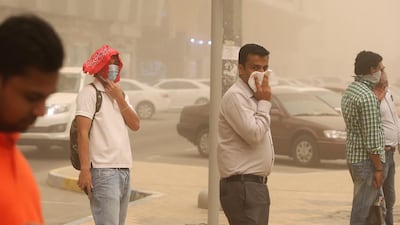DUBAI // Seasonal asthma attacks are costing millions to treat, affecting workplace productivity and keeping children from learning in the classroom, a UAE survey has shown.
Tuesday is World Asthma Day and the World Health Organisation says that the condition, which is a narrowing of airways leading to breathing difficulties, now affects more than 235 million globally.
Although specific causes vary, genetics, dust, climate and air quality are common triggers.
An Asthma Insights and Reality survey in the Gulf and Near East showed 40 per cent of UAE asthmatics reported unscheduled emergency visits last year, with 64 per cent suffering sudden severe asthma attacks.
Almost one third said they were forced to take time off work and 52 per cent of children with asthma missed school.
Mother of two Theresa Tsui, 43, who lives in Jumeirah, has had asthma since she was 15.
Mrs Tsui moved to Dubai eight years ago and has established her own business teaching art but she has been forced to take regular time off work due to her asthma.
“I’ve had bronchitis as a result from not treating my asthma correctly,” she said.
“It has kept me off work in the UK and here. My productivity levels dropped so I was signed off.
“There was a bit of sympathy at first but I was regularly off work a couple of days a month. Now I’m self-employed but there is no sick pay.”
Her symptoms are brought on by dust, sandstorms, mould and damp or humid weather. She takes medication in the form of a steroid inhaler but has also found regular yoga sessions help.
“For the past 18 months I have had to take time off on three occasions, each time for about a week,” she added.
“I tried to go back to work after a few days but it would just make it worse and I can’t then teach.
“I have had to cancel classes, that is tough when you are running a small business as revenues drop.”
The AIRGNE study was the first to identify the drain on the UAE’s health system and productivity if effective treatment was not available.
Two hundred asthmatics were surveyed. More than half believed their asthma was getting better, but 71 per cent reported seasonal asthma attacks.
Marc Blacha, 30, is a DJ from Denmark living in Dubai Marina. He has been asthmatic since the age of three, but although he often worked in smoky environments, medication had helped reduce his symptoms.
“In Denmark, I had to take my medication twice a day but in Dubai it has been a lot easier to breathe,” he said.
“Now I can go up to two weeks without my medication because I know how to bring it under control.”
Two effective asthma medications have been combined in trials of 5,000 people by pharmaceutical developers Mundipharma to help improve the long-term treatment of the disease.
Doctors can tailor the dosage in an aerosol device to suit each patient’s needs. The combination improved the percentage of symptom-free days while reducing sleep disturbances.
Asthma specialist Dr Ashraf Allam, an Egyptian pharmacist in Dubai, said treatments were widely available to reduce the symptoms, if they were used correctly. “In the Middle East, patients consistently underestimate the seriousness of their asthma,” he said.
“They are less likely to pay attention to symptoms when they are not severe, which has profound effects on their daily lives, including work and school performance.
“In Dubai it is estimated about Dh88 million was spent on treating asthmatics in 2014. That is a cost, but there is also a significant cost in the workplace.”
Emiratis are 4.2 times more likely than expatriates to suffer from asthma, and women 1.8 times more likely than men. In 2011, there were 139,092 reported cases of asthma attacks.
Dr Allam said some would only seek treatment once they had had an attack.
“People here in the UAE tend not to monitor their condition,” he said.
“Most doctors will prescribe an inhaler, but using it is a skill that needs to be learnt by the patient.
“Poor technique leads to poor asthma control and that creates a vicious circle where people are forced to take time off work and school.”
nwebster@thenational.ae


